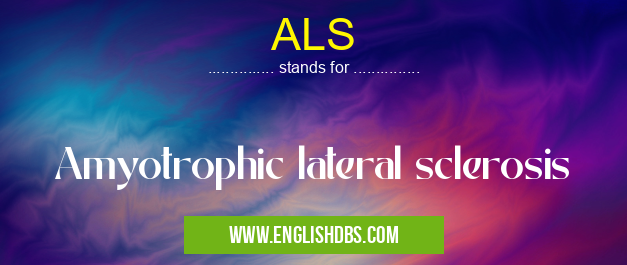What does ALS mean in NURSING
ALS, or Amyotrophic Lateral Sclerosis, is a progressive neurological condition that affects nerve cells in the brain and spinal cord. Also known as Lou Gehrig’s Disease, ALS causes muscle weakness, muscle spasms, and difficulty speaking and swallowing. In severe cases, it can even lead to paralysis. ALS is usually fatal within two to five years of diagnosis. While there is no cure for the disease, treatments can help relieve some of the symptoms and slow down its progression.

ALS meaning in Nursing in Medical
ALS mostly used in an acronym Nursing in Category Medical that means Amyotrophic lateral sclerosis
Shorthand: ALS,
Full Form: Amyotrophic lateral sclerosis
For more information of "Amyotrophic lateral sclerosis", see the section below.
Symptoms
Most people who are experiencing early ALS will experience a gradual onset of muscle weakness, slurred speech, twitching muscles (fasciculations), cramps in certain areas of the body, fatigue, depression, difficulty swallowing and difficulty breathing. As the disease progresses these symptoms become more severe leading to complete limb paralysis and further respiratory difficulties which ultimately leads to death.
Treatment
There is no known cure for ALS but treatments are available that can slow down its progression by helping manage symptoms like pain or airway obstruction caused by weakness in breathing muscles. Various medications have been developed over recent years which target different systems in the body such as calcium channel blockers or neuroprotectants which help reduce inflammation in neurons and protect against further damage.
Essential Questions and Answers on Amyotrophic lateral sclerosis in "MEDICAL»NURSING"
What is Amyotrophic Lateral Sclerosis?
Amyotrophic lateral sclerosis (ALS) is a progressive neurological disease that affects nerve cells in the brain and spinal cord, leading to muscle weakness and paralysis. ALS is also known as Lou Gehrig's disease, after the famous baseball player who was diagnosed with it in 1939.
What are the main symptoms of ALS?
The main symptoms of ALS are muscle weakness, difficulty walking or speaking, twitching, and an inability to control muscles that cause speech or breathing. These symptoms may vary from person to person but usually progress over time if left untreated.
Is there a cure for ALS?
Unfortunately, there is no known cure for ALS. However, there are treatments available which can help slow down the progression of the disease and improve quality of life for those living with it.
Can lifestyle changes help prevent or treat ALS?
There is currently no known way to prevent or treat ALS through lifestyle changes alone, however making healthy lifestyle choices such as eating a balanced diet and getting regular exercise may be beneficial to maintaining overall health and wellbeing while living with the condition.
Are there any support groups or resources available for people with ALS?
Yes! There are several support groups available both online and offline which provide information, advice and emotional support for people living with ALS and their caregivers. Additionally, many organizations exist which provide financial assistance to those dealing with medical bills related to their treatment.
Who should I contact if I am concerned about developing ALS?
If you have concerns about developing ALS then it is important to speak with your doctor so they can assess your individual risk factors and suggest any necessary tests or further evaluations that may be needed.
How common is Amyotrophic Lateral Sclerosis?
The exact prevalence of ALS is unknown but estimates suggest it affects approximately 2 per 100 000 people worldwide each year. It usually affects adults between the ages of 40-60 although younger people can also develop the condition.
Are there any dietary restrictions associated with living with ALS?
Not necessarily - everyone's needs will be different based on their individual condition so it's best to discuss this with your doctor who can advise you on how best to address your nutritional needs while managing your symptoms effectively.
Can people living with Amyotrophic Lateral Sclerosis lead active lives?
Yes! Although individuals living with ALS may find that certain activities become more difficult as the condition progresses, many are still able to remain physically active without putting undue strain on their bodies by participating in low impact exercise such as swimming or yoga as well as leisure activities like gardening or taking walks outdoors. With proper planning these activities can become an enjoyable part of daily life for someone living with this condition.
Final Words:
ALS is an incurable disease that can have a profound effect on those it affects both physically and emotionally. However with modern advances in medicine there are now treatments available which can help patients manage their symptoms better so that they can continue living their life with some degree of independence for as long as possible despite their diagnosis. Although there may not yet be a cure for ALS research continues into new treatments and therapies every day offering hope that one day this terrible neurological disorder will be overcome.
ALS also stands for: |
|
| All stands for ALS |
